适配内核到新的平台,基本环境搭建好之后,首要的就是要调通调试串口,方便后面的信息打印。正常流程init/main.c中start_kernel入口,要到console_init之后才能真正打印,前面的打印都是缓存在printk的ringbuffer中的。如果在console_init前就异常了,此时就看不到打印信息,为了调试console_init前的状态,需要能更早的打印。内核提供了一种early打印的方式,尤其是riscv平台我们可以直接ecall调用opensbi的打印,这样opensbi适配好之后这里就可以直接使用。这一篇就来分析下kernel的early打印数据流。
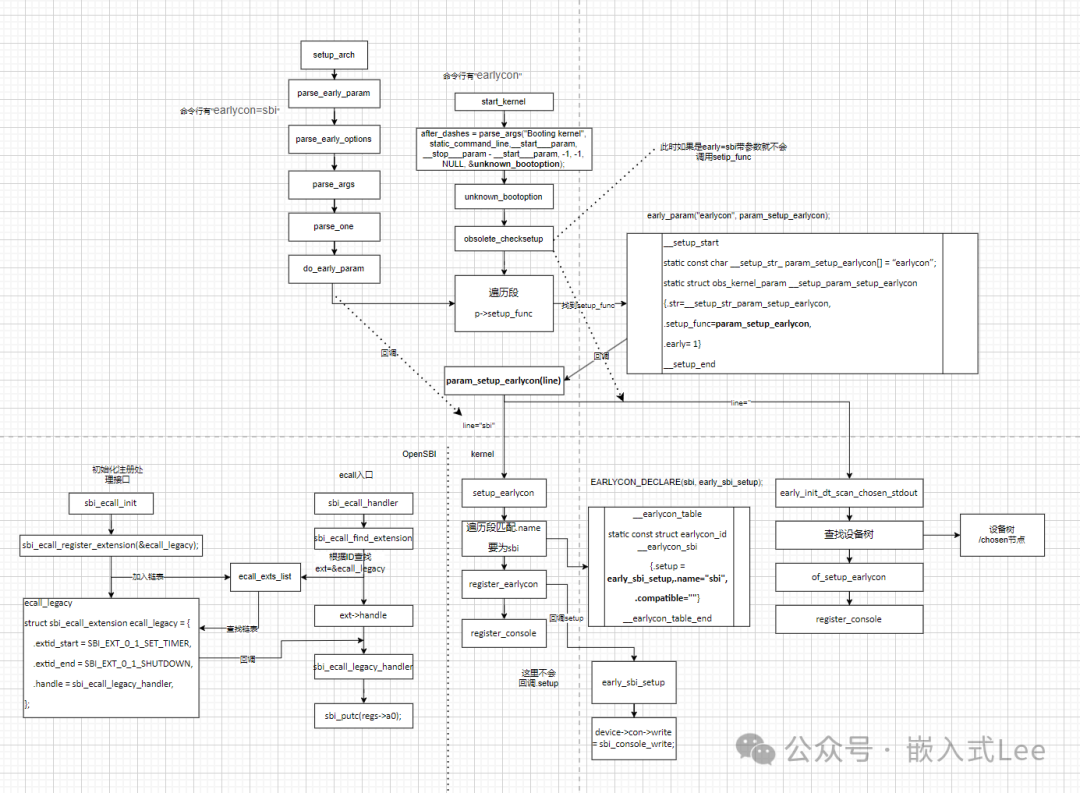
使能early打印需要做一些配置
menuconfig
Device Drivers --->
Character devices --->
Serial drivers --->
[*] Early console using RISC-V SBI
对应配置项drivers/tty/serial/Kconfig中
SERIAL_EARLYCON_RISCV_SBI
config SERIAL_EARLYCON_RISCV_SBIbool "Early console using RISC-V SBI"depends on RISCV_SBI_V01select SERIAL_COREselect SERIAL_CORE_CONSOLEselect SERIAL_EARLYCONhelpSupport for early debug console using RISC-V SBI. This enablesthe console before standard serial driver is probed. This is enabledwith "earlycon=sbi" on the kernel command line. The console isenabled when early_param is processed.
依赖RISCV_SBI_V01,该选项配置之后默认也会配置
SERIAL_CORE
SERIAL_CORE_CONSOLE
SERIAL_EARLYCON
其中RISCV_SBI_V01是默认使能的,依赖于RISCV_SBI
config RISCV_SBI_V01bool "SBI v0.1 support"default ydepends on RISCV_SBIhelpThis config allows kernel to use SBI v0.1 APIs. This will bedeprecated in future once legacy M-mode software are no longer in use.
RISCV_SBI默认也是y,依赖!RISCV_M_MODE
config RISCV_SBIbooldepends on !RISCV_M_MODEdefault y
RISC_M_MODE又依赖!MMU,即如果不适用MMU则内核跑M模式
set if we run in machine mode, cleared if we run in supervisor modeconfig RISCV_M_MODEbooldefault !MMU
MMU默认是y
config MMUbool "MMU-based Paged Memory Management Support"default yhelpSelect if you want MMU-based virtualised addressing spacesupport by paged memory management. If unsure, say 'Y'.
配置后output/.config中
CONFIG_SERIAL_EARLYCON_RISCV_SBI=y
output/include/config/auto.conf中
CONFIG_SERIAL_EARLYCON_RISCV_SBI=y
output/include/generated/autoconf.h中
#define CONFIG_SERIAL_EARLYCON_RISCV_SBI 1
drivers/tty/serial/Makefile中编译对应的文件 earlycon-riscv-sbi.c
obj-$(CONFIG_SERIAL_EARLYCON_RISCV_SBI) += earlycon-riscv-sbi.o
drivers/tty/serial/earlycon-riscv-sbi.c
其中early_sbi_setup设置对应的写接口
static int __init early_sbi_setup(struct earlycon_device *device,const char *opt){device->con->write = sbi_console_write;return 0;}
实现如下
static void sbi_console_write(struct console *con,const char *s, unsigned n){struct earlycon_device *dev = con->data;uart_console_write(&dev->port, s, n, sbi_putc);}
最终实际是调用sbi_putc接口写
static void sbi_putc(struct uart_port *port, int c){sbi_console_putchar(c);}
sbi_console_putchar在arch/riscv/kernel/sbi.c中实现
通过ecall调用opensbi中的实现,
前面我们看到CONFIG_RISCV_SBI_V01是使能的
/*** sbi_console_putchar() - Writes given character to the console device.* @ch: The data to be written to the console.** Return: None*/void sbi_console_putchar(int ch){sbi_ecall(SBI_EXT_0_1_CONSOLE_PUTCHAR, 0, ch, 0, 0, 0, 0, 0);}EXPORT_SYMBOL(sbi_console_putchar);
sbi_ecall在
arch/riscv/kernel/sbi.c中实现
struct sbiret sbi_ecall(int ext, int fid, unsigned long arg0,unsigned long arg1, unsigned long arg2,unsigned long arg3, unsigned long arg4,unsigned long arg5){struct sbiret ret;register uintptr_t a0 asm ("a0") = (uintptr_t)(arg0);register uintptr_t a1 asm ("a1") = (uintptr_t)(arg1);register uintptr_t a2 asm ("a2") = (uintptr_t)(arg2);register uintptr_t a3 asm ("a3") = (uintptr_t)(arg3);register uintptr_t a4 asm ("a4") = (uintptr_t)(arg4);register uintptr_t a5 asm ("a5") = (uintptr_t)(arg5);register uintptr_t a6 asm ("a6") = (uintptr_t)(fid);register uintptr_t a7 asm ("a7") = (uintptr_t)(ext);asm volatile ("ecall": "+r" (a0), "+r" (a1): "r" (a2), "r" (a3), "r" (a4), "r" (a5), "r" (a6), "r" (a7): "memory");ret.error = a0;ret.value = a1;return ret;}
其中第一个参数ext即SBI_EXT_0_1_CONSOLE_PUTCHAR=1放在寄存器a7中。
要使能earlycon功能,需要给内核传入参数earlycon=xxx,
xxx表示对应的驱动和参数,我们这里是sbi使用sbi的串口输出,如果没有指定xxx则从设备树的chosen节点解析串口。
参考《https://www.kernel.org/doc/html/v4.14/admin-guide/kernel-parameters.html》下搜索earlycon。
对应流程如下,如下位置对early后面是否有参数进行不同的处理
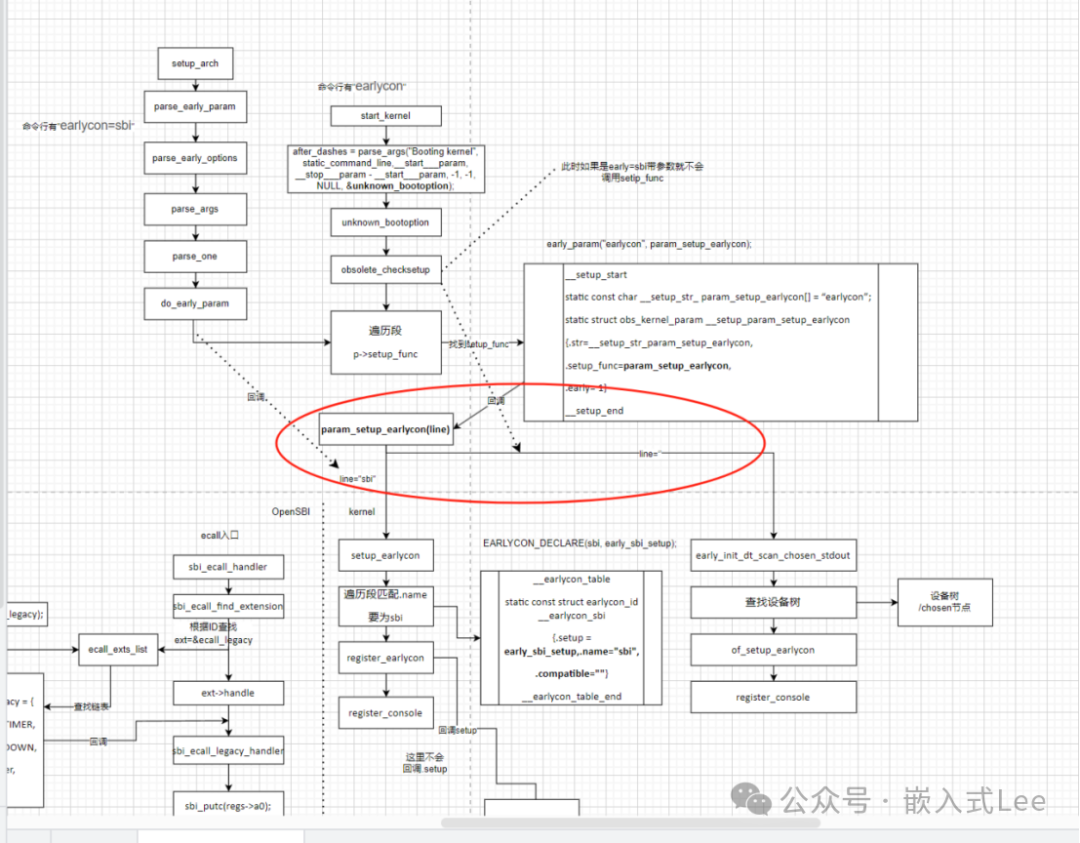
可以手动添加参数:
arch/riscv/Kconfig中如下配置CMDLINE
config CMDLINEstring "Built-in kernel command line"helpFor most platforms, the arguments for the kernel's command lineare provided at run-time, during boot. However, there are caseswhere either no arguments are being provided or the providedarguments are insufficient or even invalid.When that occurs, it is possible to define a built-in commandline here and choose how the kernel should use it later on.
menuconfig配置
Boot options --->
(earlycon=sbi) Built-in kernel command line
配置完对应output/.config中
CONFIG_CMDLINE="earlycon=sbi"
include/generated/autoconf.h中
#define CONFIG_CMDLINE "earlycon=sbi"
我们就来分析下earlycon=sbi时的路径。
drivers/tty/serial/earlycon.c中
early_param("earlycon", param_setup_earlycon);
其中include/linux/init.h中
__setup_param(str, fn, fn, 1)static const char __setup_str___aligned(1) = str; \static struct obs_kernel_param __setup___used __section(".init.setup") \__attribute__((aligned((sizeof(long))))) \= { __setup_str_
展开为
__setup_param("earlycon", param_setup_earlycon, param_setup_earlycon,1)
继续展开
static const char __setup_str_ param_setup_earlycon[] __initconst
__aligned(1) = “earlycon”;
static struct obs_kernel_param __setup_param_setup_earlycon
__used __section(".init.setup")
__attribute__((aligned((sizeof(long)))))
={__setup_str_param_setup_earlycon, param_setup_earlycon, 1}
即定义了一个static struct obs_kernel_param类型结构体变量__setup_param_setup_earlycon,
放置在段.init.setup中按照sizeof(long)对齐,结构体内容是
{.str=__setup_str_param_setup_earlycon,
.setup_func=param_setup_earlycon,
.early= 1}
__setup_str_param_setup_earlycon即前面的字符数组内容是”earlycon”。
param_setup_earlycon是回调函数
其中结构体 struct obs_kernel_param如include/linux/init.h
struct obs_kernel_param {const char *str;int (*setup_func)(char *);int early;};
include/asm-generic/vmlinux.lds.h中
#define INIT_SETUP(initsetup_align) \. = ALIGN(initsetup_align); \__setup_start = .; \KEEP(*(.init.setup)) \__setup_end = .;#define INIT_DATA_SECTION(initsetup_align) \.init.data : AT(ADDR(.init.data) - LOAD_OFFSET) { \INIT_DATA \INIT_SETUP(initsetup_align) \INIT_CALLS \CON_INITCALL \INIT_RAM_FS \}
arch/riscv/kernel/vmlinux.lds.S中
INIT_DATA_SECTION(16)
所以上述变量放在了.init.setup段
开始位置是__setup_start
init/main.c中申明变量以便访问
extern const struct obs_kernel_param __setup_start[], __setup_end[];
如下函数遍历上述.init.setup段,遍历每个结构体,回调对应的setup_func,这里即param_setup_earlycon。
static bool __init obsolete_checksetup(char *line){const struct obs_kernel_param *p;bool had_early_param = false;p = __setup_start;do {int n = strlen(p->str);if (parameqn(line, p->str, n)) {if (p->early) {/* Already done in parse_early_param?* (Needs exact match on param part).* Keep iterating, as we can have early* params and __setups of same names 8( */if (line[n] == '\0' || line[n] == '=')had_early_param = true;} else if (!p->setup_func) {pr_warn("Parameter %s is obsolete, ignored\n",p->str);return true;} else if (p->setup_func(line + n))return true;}p++;} while (p < __setup_end);return had_early_param;}
在obsolete_checksetup这里打断点,我们来跟踪分析函数的处理过程
此时我们看到
unknown_bootoption传过来的参数值为param=earlycon,val=sbi,
正是我们配置的参数。
至于参数是怎么解析的参考parse_args。
调用路径是start_kernel->pares_args->unknown_bootoption
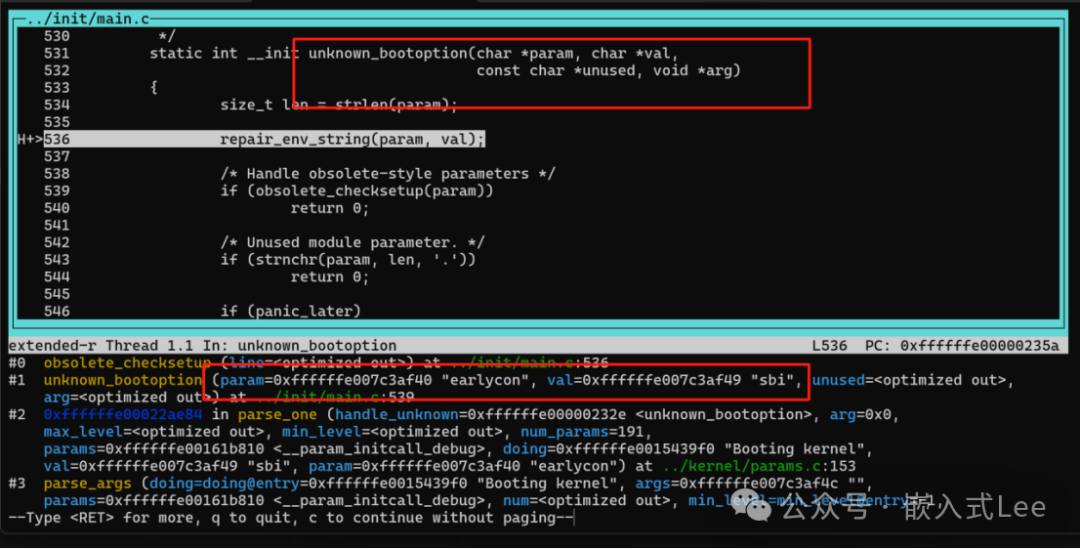
执行完repair_env_string
参数param变为了earlycon=sbi
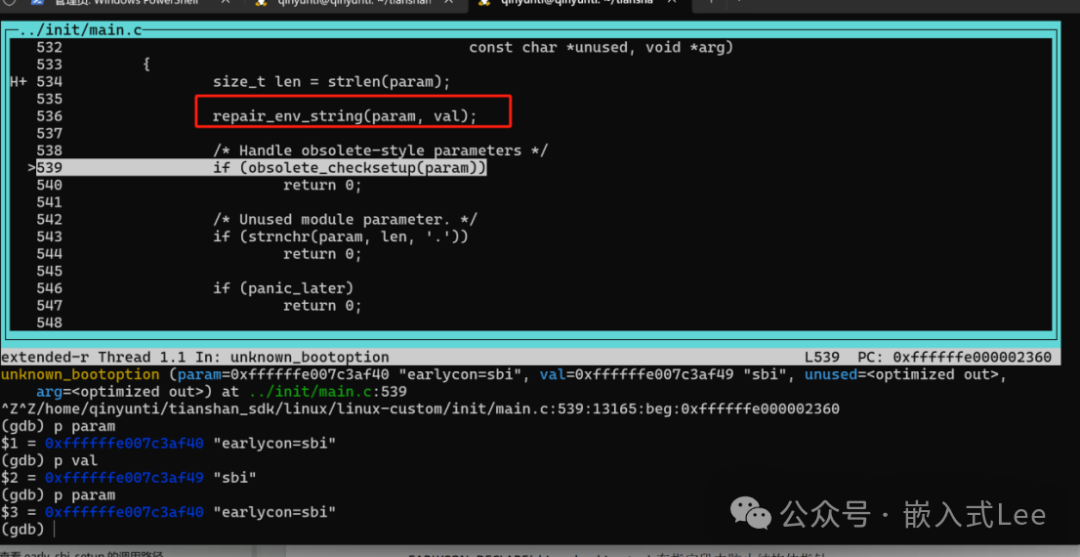
继续单步进入obsolete_checksetup
然后从__setup_start开始遍历段,需要满足参数即line和p->str参数匹配这里line就是earlycon=sbi,通过函数parameqn匹配,然后要满足p->early=1
再来看我们定义的结构体
early_param("earlycon", param_setup_earlycon);
会满足这两个条件
static const char __setup_str_ param_setup_earlycon[] = “earlycon”;
static struct obs_kernel_param __setup_param_setup_earlycon
{.str=__setup_str_param_setup_earlycon,
.setup_func=param_setup_earlycon,
.early= 1}
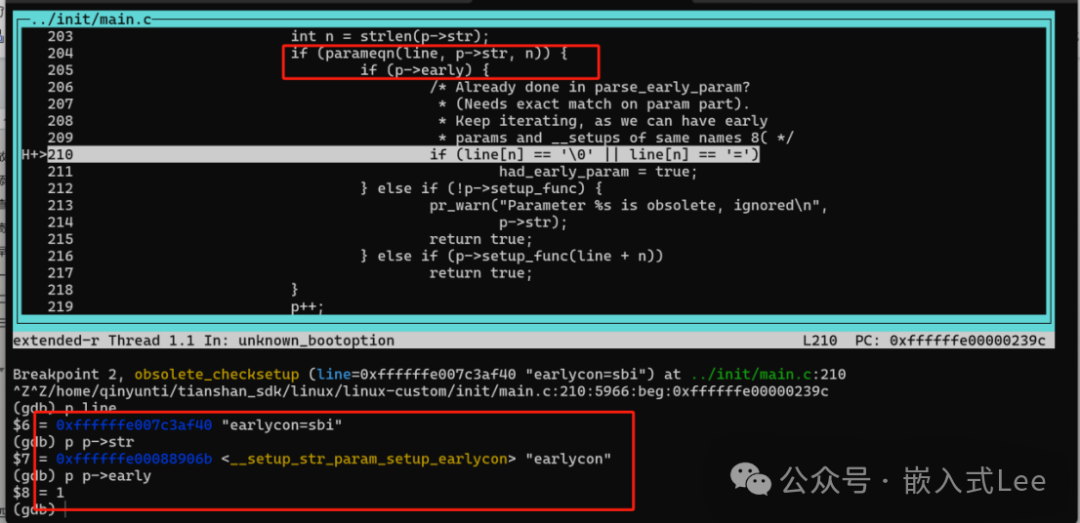
接下来
line[n] == '='满足
这里直接返回true,所以如下路径是不通的,这里路只能使early不带参数时,走early_init_dt_scan_chosen_stdout查找/chosen的节点。
此时就不会调用param_setup_earlycon(line)
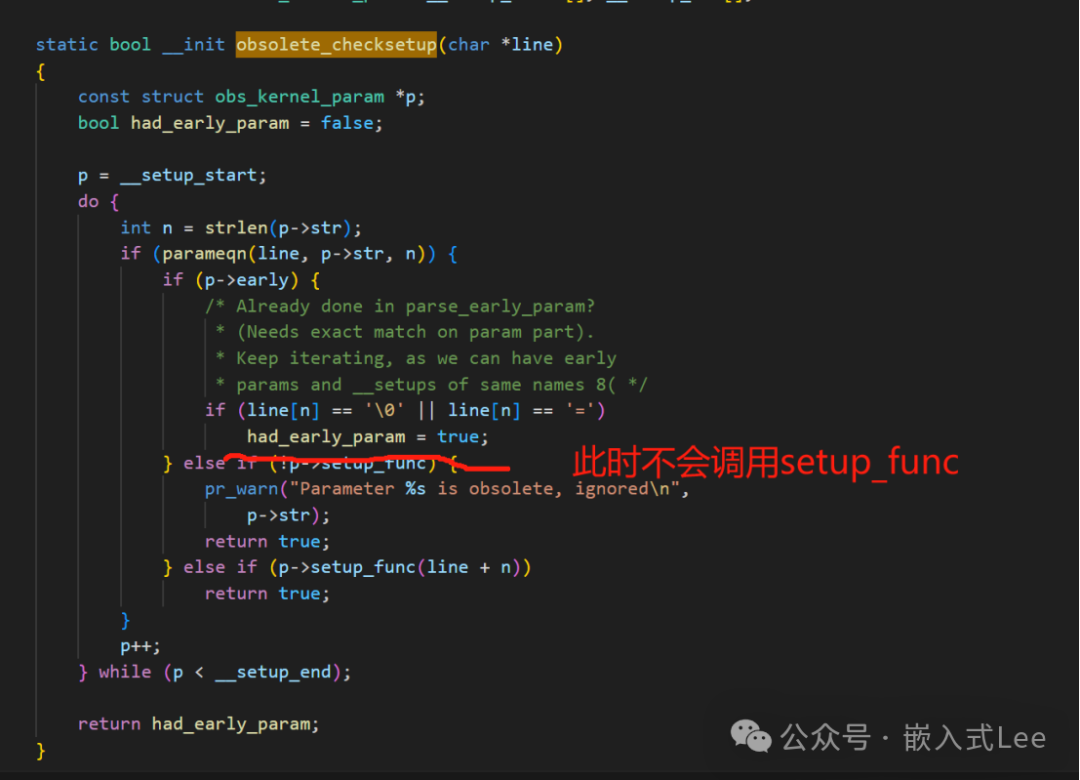
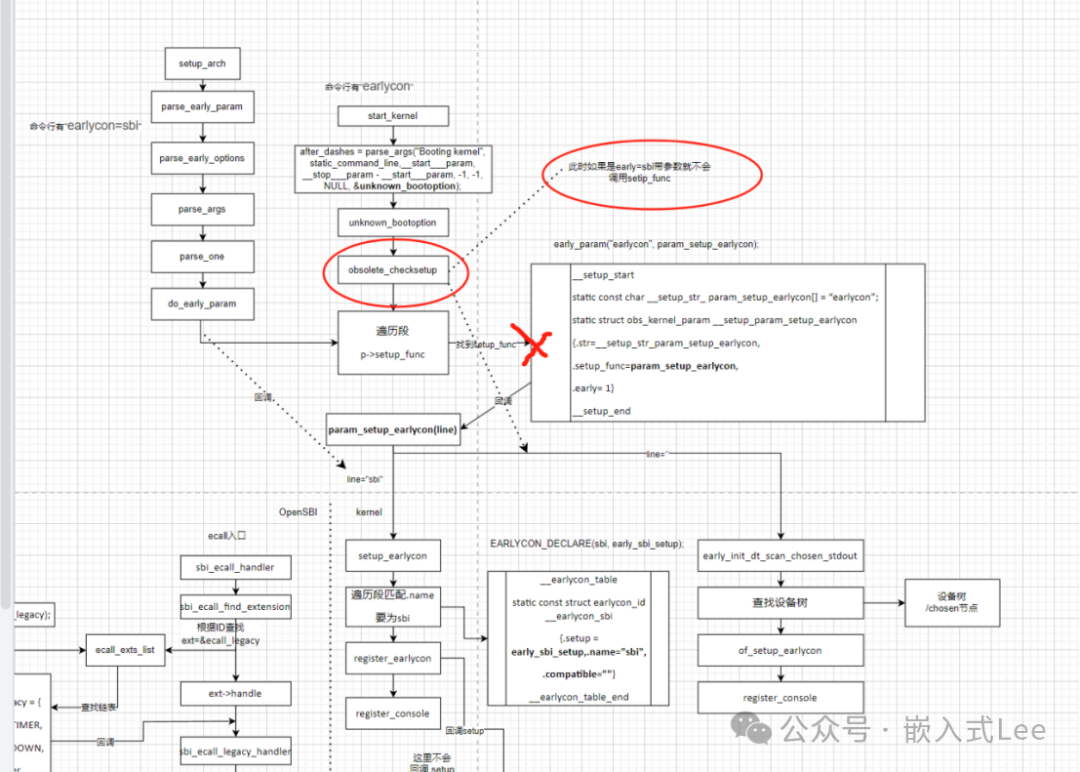
而只有此时不带参数即只有early时才会调用setup_func即param_setup_earlycon,传入的参数line=空
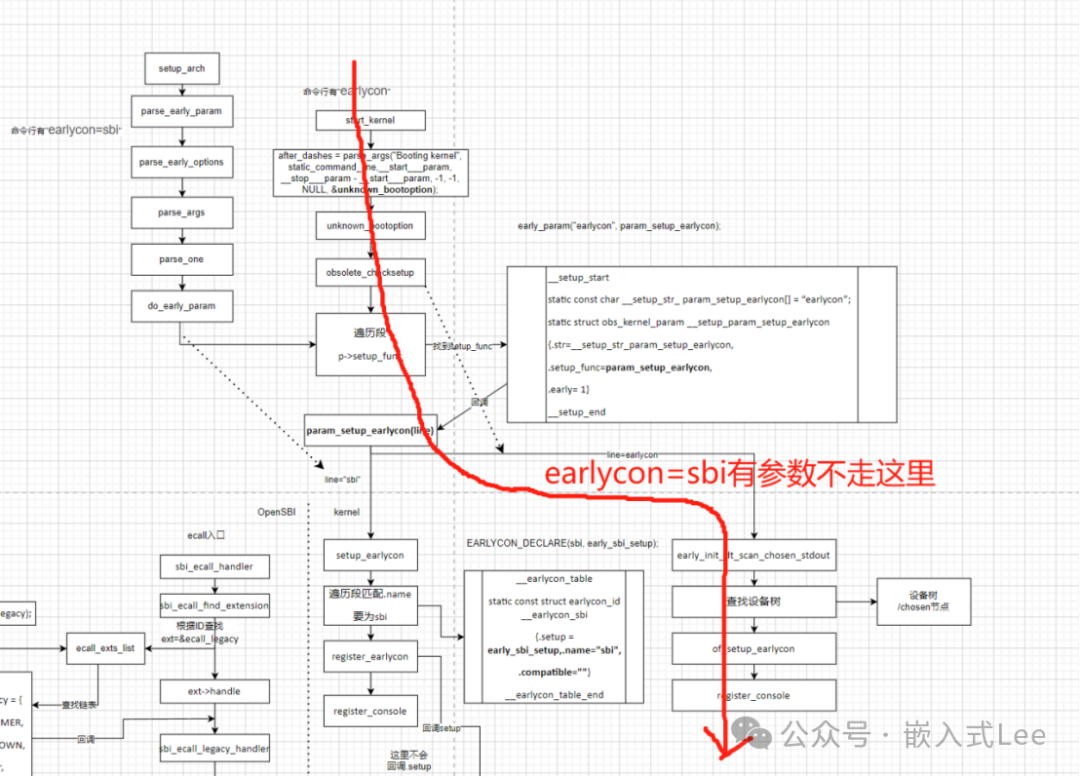
实际early=sbi这里走到是另外一条路,如下图所示
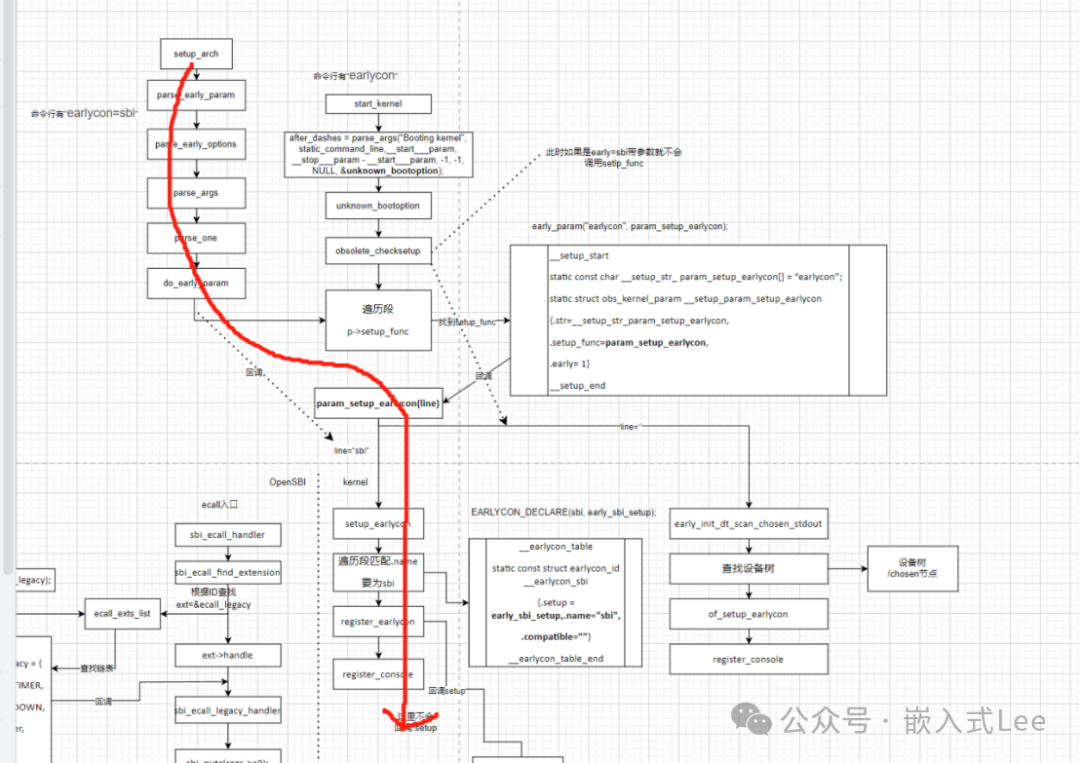
对应do_early_param时会回调setup_func,但是此时传递的参数param_setup_earlycon(line)中的line是val即sbi了。和上面一条路传递的参数early不一样了。
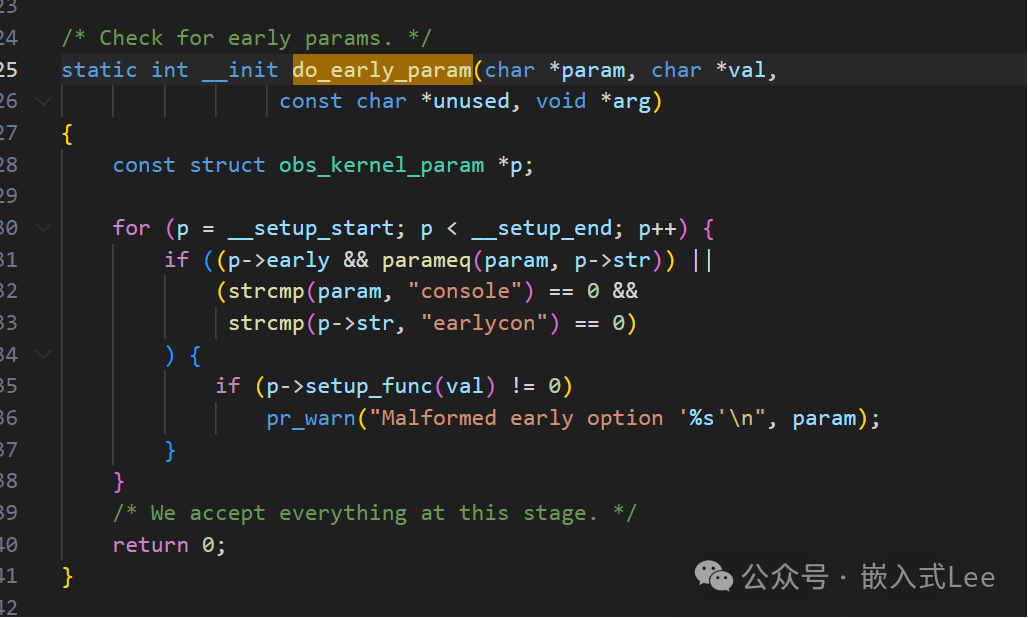
do_early_param时param=early,val=sbi
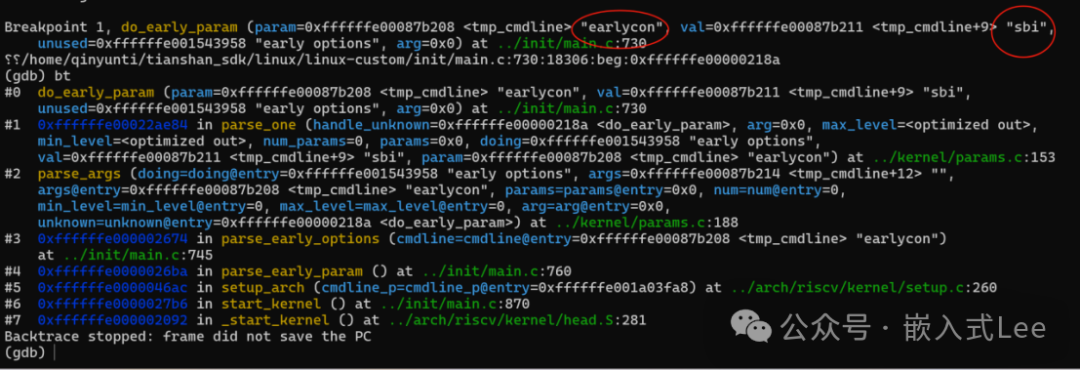
param_setup_earlycon(line)时line=sbi
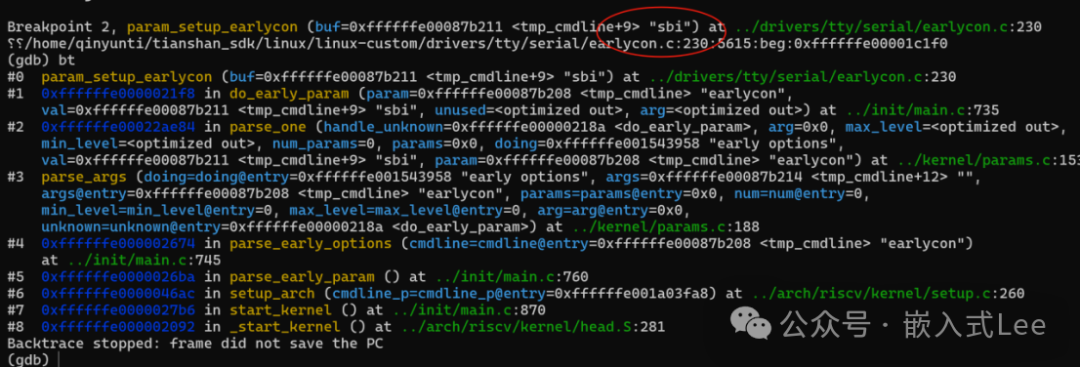
而如果走obsolete_checksetup这边的路径,line传入的参数为空
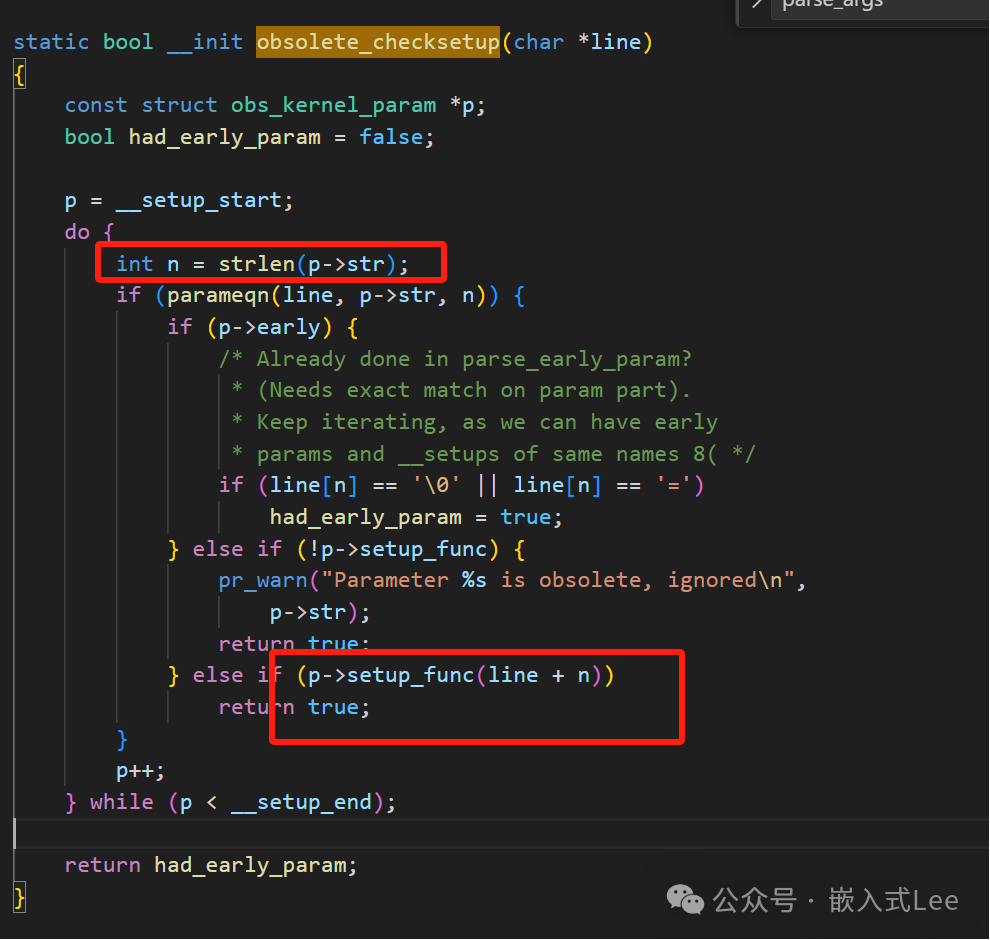
此时回调
param_setup_earlycon(line)
时走early_init_dt_scan_chosen_stdout
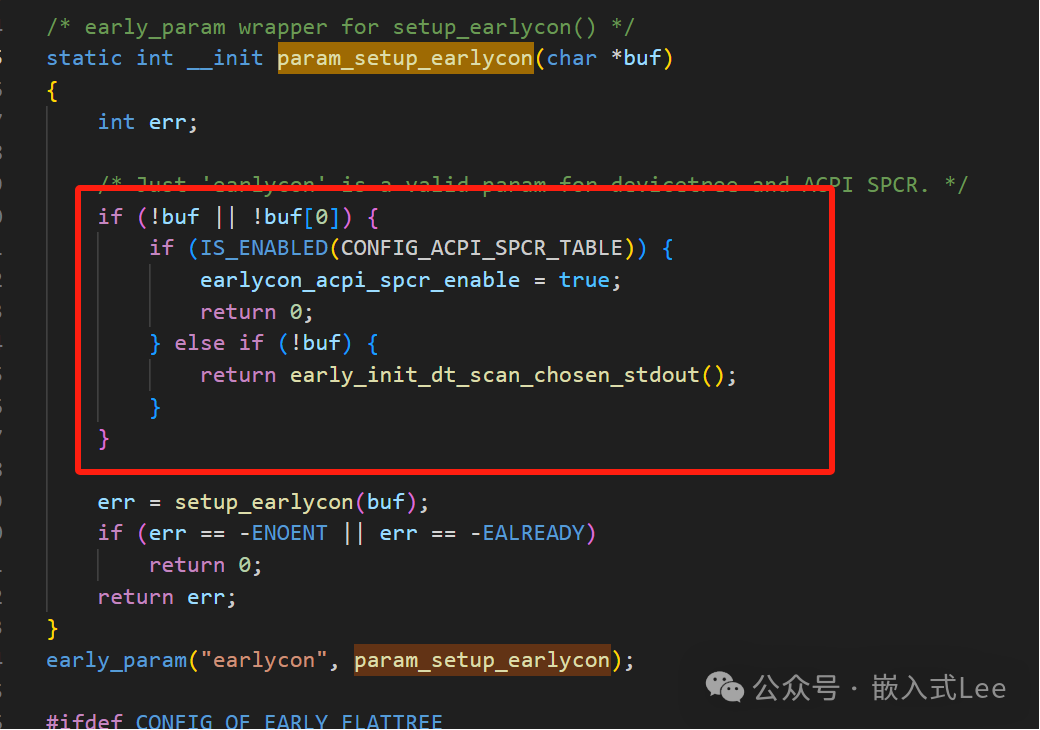
EARLYCON_DECLARE(sbi, early_sbi_setup);在指定段中放置结构体指针,
初始化时遍历该结构体指针,找到结构体,调用其setup函数进行初始化。
在include/linux/serial_core.h中
static const struct earlycon_id unique_id \EARLYCON_USED_OR_UNUSED __initconst \= { .name = __stringify(_name), \.compatible = compat, \.setup = fn }; \static const struct earlycon_id EARLYCON_USED_OR_UNUSED \__section("__earlycon_table") \* const __PASTE(__p, unique_id) = &unique_id_OF_EARLYCON_DECLARE(_name, compat, fn, \__UNIQUE_ID(__earlycon_
就是定义了一个结构体
struct earlycon_id
在include/linux/serial_core.h中
struct earlycon_id {char name[15];char name_term; /* In case compiler didn't '\0' term name */char compatible[128];int (*setup)(struct earlycon_device *, const char *options);};
static const struct earlycon_id __earlycon_sbi且
其成员
.setup = early_sbi_setup
然后定义了一个指针变量__p__earlycon_sbi指向了这个结构体
static const struct earlycon_id * const __p__earlycon_sbi = & __earlycon_sbi
该指针放在了段__earlycon_table中
source/include/asm-generic/vmlinux.lds.h中
__earlycon_table = .; \KEEP(*(__earlycon_table)) \__earlycon_table_end = .;
符号__earlycon_table表示该段的开始
drivers/tty/serial/earlycon.c中
setup_earlycon
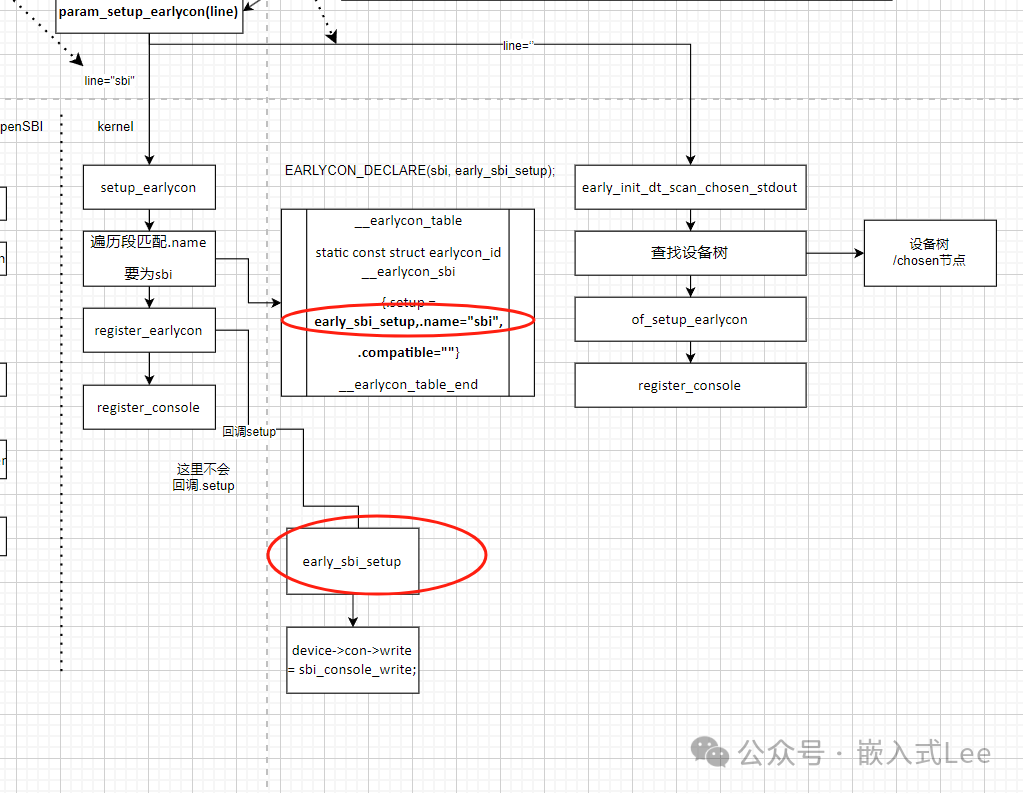
如果是走右边这条路
drivers/of/fdt.c中
early_init_dt_scan_chosen_stdout
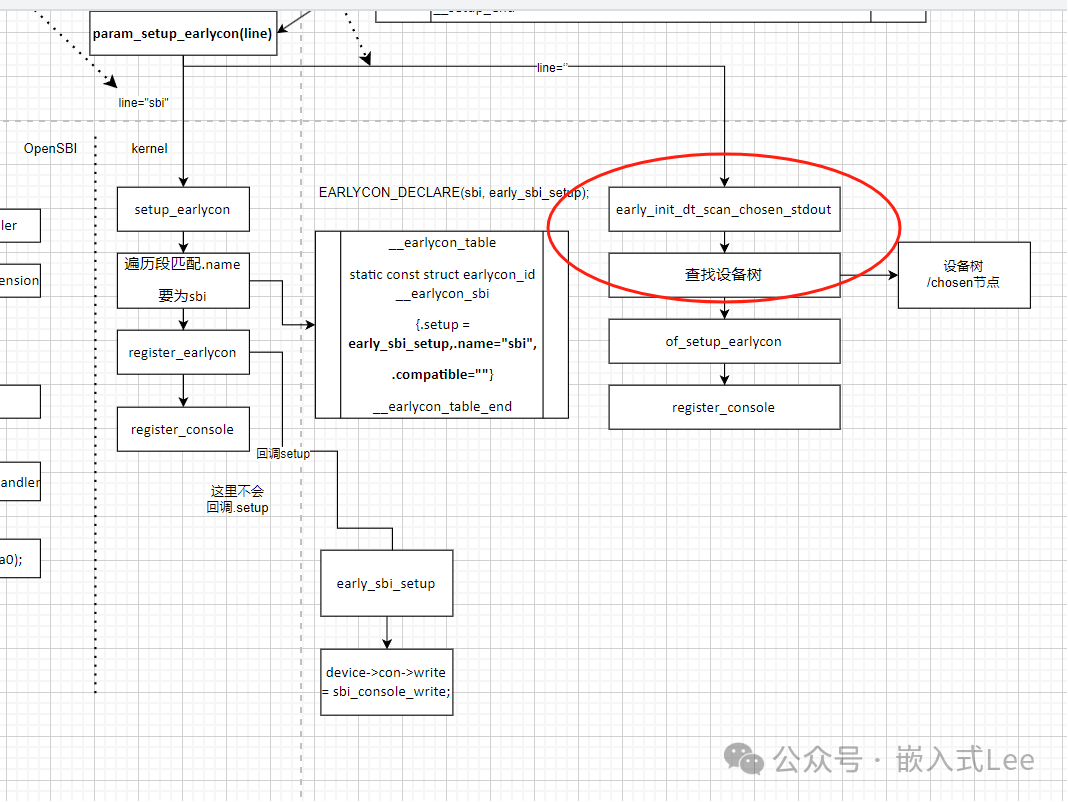
最终都是注册控制台register_console
而走左边的sbi路径会回调early_sbi_setup将写接口改为
device->con->write = sbi_console_write;调用sbi打印。
lib/sbi/sbi_ecall.c中
ecall处理入口如下
int sbi_ecall_handler(struct sbi_trap_regs *regs){int ret = 0;struct sbi_ecall_extension *ext;unsigned long extension_id = regs->a7;unsigned long func_id = regs->a6;struct sbi_trap_info trap = {0};unsigned long out_val = 0;bool is_0_1_spec = 0;ext = sbi_ecall_find_extension(extension_id);if (ext && ext->handle) {ret = ext->handle(extension_id, func_id,regs, &out_val, &trap);if (extension_id >= SBI_EXT_0_1_SET_TIMER &&extension_id <= SBI_EXT_0_1_SHUTDOWN)is_0_1_spec = 1;} else {ret = SBI_ENOTSUPP;}
ext即传过来的a7,待打印字符通过a0传递。以下即获取该ext。
ext = sbi_ecall_find_extension(extension_id);
include/sbi/sbi_ecall_interface.h中定义对应的ext宏。
#define SBI_EXT_0_1_CONSOLE_PUTCHAR 0x1
#define SBI_EXT_0_1_CONSOLE_GETCHAR 0x2
然后回调对应的处理接口
ret = ext->handle(extension_id, func_id,
regs, &out_val, &trap);
Handle回调在如下地方注册
sbi_ecall_init->
ret = sbi_ecall_register_extension(&ecall_legacy);
sbi_ecall_register_extension在lib/sbi/sbi_ecall.c中实现
int sbi_ecall_register_extension(struct sbi_ecall_extension *ext){struct sbi_ecall_extension *t;if (!ext || (ext->extid_end < ext->extid_start) || !ext->handle)return SBI_EINVAL;sbi_list_for_each_entry(t, &ecall_exts_list, head) {unsigned long start = t->extid_start;unsigned long end = t->extid_end;if (end < ext->extid_start || ext->extid_end < start)/* no overlap */;elsereturn SBI_EINVAL;}SBI_INIT_LIST_HEAD(&ext->head);sbi_list_add_tail(&ext->head, &ecall_exts_list);return 0;}
ecall_legacy在
lib/sbi/sbi_ecall_legacy.c中定义
struct sbi_ecall_extension ecall_legacy = {.extid_start = SBI_EXT_0_1_SET_TIMER,.extid_end = SBI_EXT_0_1_SHUTDOWN,.handle = sbi_ecall_legacy_handler,};
所以最终回调其handle即
sbi_ecall_legacy_handler在lib/sbi/sbi_ecall_legacy.c中实现
该函数就根据ext=SBI_EXT_0_1_CONSOLE_PUTCHAR,最终调用sbi_putc发送一个字符
case SBI_EXT_0_1_CONSOLE_PUTCHAR:sbi_putc(regs->a0);break;case SBI_EXT_0_1_CONSOLE_GETCHAR:ret = sbi_getc();break;
走setup_earlycon
在如下位置打断点运行到到断点处,查看调用栈
hb setup_earlycon
c
hb early_sbi_setup
c
bt
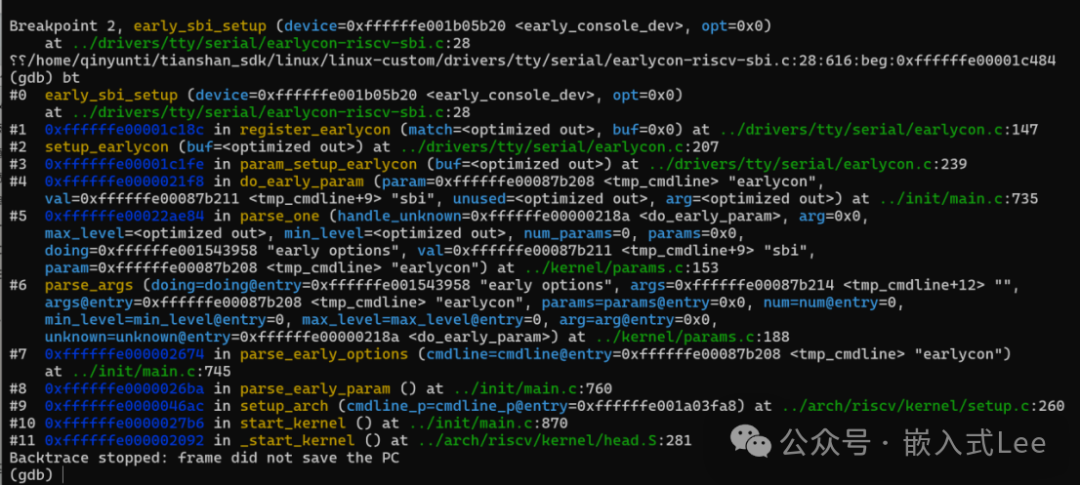
对应如下路径

此时走设备树/chosen的串口
走early_init_dt_scan_chosen_stdout
hb early_init_dt_scan_chosen_stdout
c
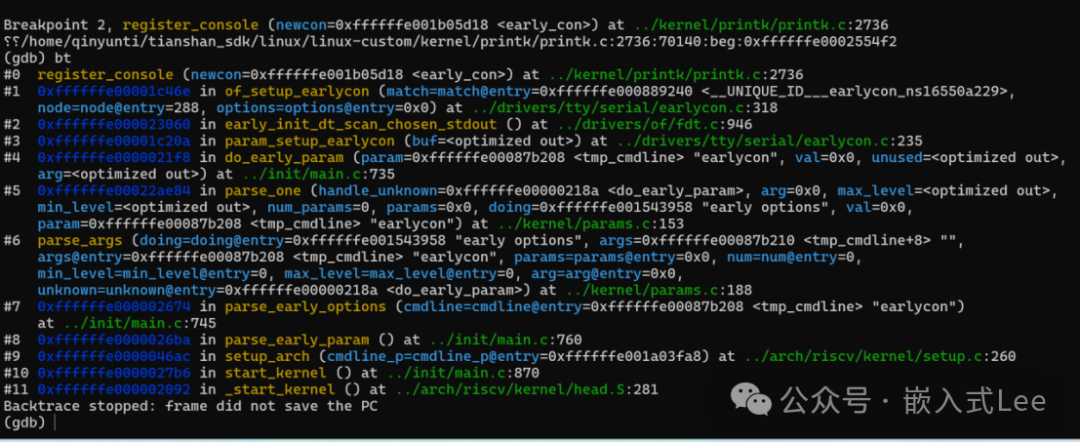
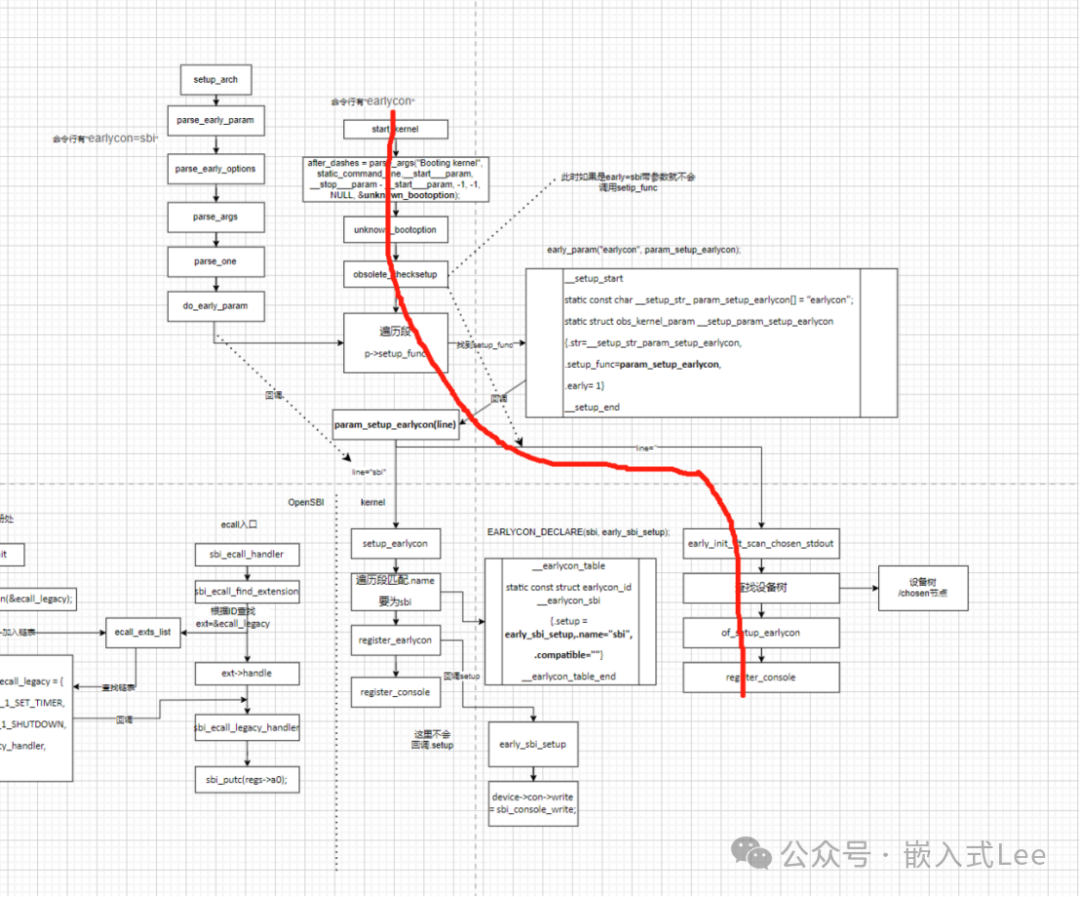
hb sbi_console_write
c
bt
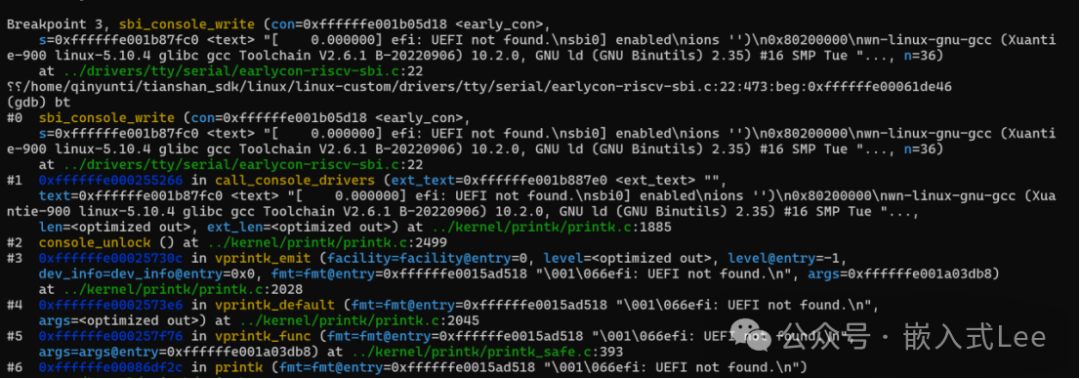
看到在console_init();之前此时就可以打印了,之前是必须要在console_init();之后才真正打印,之前是打印在ringbuffer中的缓存的。

最终是调用ecall完成打印
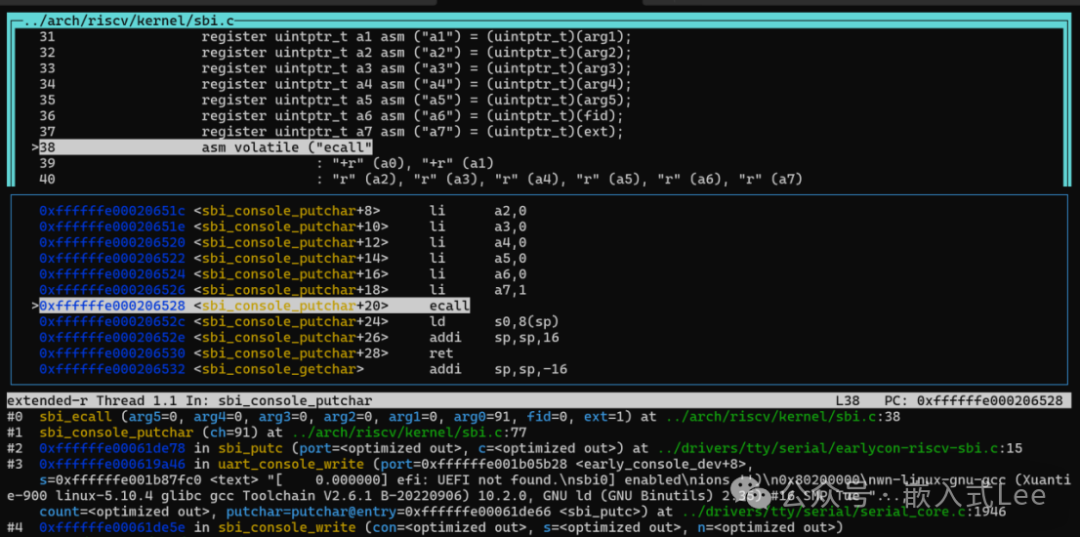
如果要使能early通过opensbi打印,要使配置参数early=sbi,且使能early打印,此时在console_init之前就可以进行直接打印。